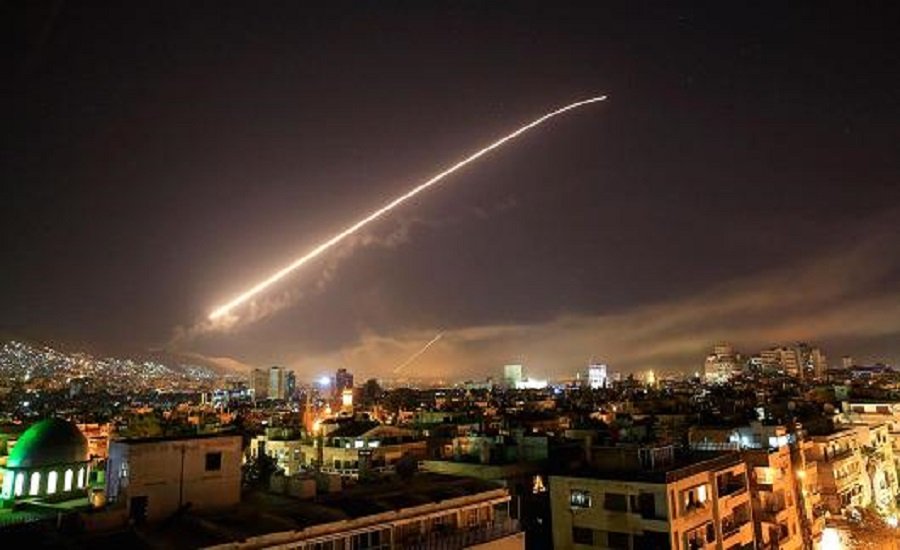
Friday’s strikes would have no impact on the military situation inside Syria. But they have killed the already bleak prospects of a political solution to the crisis.
Atif Shamim Syed | Caravan Daily
ON Friday, April 14, 2018, in the early hours of the morning, the United States, the United Kingdom and France jointly carried out a series of missile strikes against several government sites in Syria. The strikes involving ships and aircrafts were a response to the regime’s chemical attack on Douma that left dozens of civilians dead in one of the last rebel strongholds near the capital Damascus.
The Syrian government and its allies denied any involvement in the chemical attack, however, the West insisted that there were proofs that the regime did, in fact, carry out the attacks.
The rhetoric on both sides started immediately after the Douma attack. At First, the Russians declared that there had been no attack in Douma at all. Then, they said that it was staged by the rebels holed up inside the enclave. Finally, they blamed the United Kingdom of conspiring and executing the chemical attack presumably, with the help of a group of volunteers known as the White Helmets.
As the West hurriedly began planning a response, the Russian foreign ministry released statement again insisting on the involvement of a third country (Britain) in the attacks. The Kremlin also mentioned how Western adventures in Libya and Iraq had failed miserably plunging both countries into the abyss of civil war, death and destruction.
The American president, on the other hand, called his Syrian counterpart an animal. He also ordered his Defense Secretary James and the Chairman of the Joint Chiefs of Staff to formulate an appropriate response for punishing Assad while avoiding Russian casualties.
It isn’t the first time that the Syrian regime has used chemical weapons against its own civilians. In 2013 after such an attack, president Obama threatened military action against Syria. It was averted after Russia mediated a deal with the regime obliging it to give up its entire stockpile of chemical weapons.
Western nations believe that Syria did not give up all of its chemical weapons in 2013, or else it had resumed production.
The Syrian civil war has claimed hundreds of thousands of innocent lives. The deaths attributed to chemical weapons are only a small fraction of the total toll, however, the West believes that if the use of such weapons go unpunished, it will set dangerous precedents for future dictators and strongmen.
Friday’s strikes in Syria were very limited in scope and meant to serve as a deterrent rather than a declaration of war. Yet, there is an inherent risk of escalation in every military strike. The US, the UK and France took extra measures to make sure that losses to Russian hardware and military personnel were kept to the minimum. Despite these precautions, the relation between Russia and the West have deteriorated to their lowest ebb.
Putin is already seething from the sanction imposed by the US treasury on some of the Kremlin’s favorite oligarchs. Millions of dollars in value have been wiped off and there are talks that some of Russia’s biggest companies may default on their loan repayments.
Then, there was the Skripal poisoning case which resulted in the expulsion of dozens of Russian diplomats from Western capitals. Putim tried to minimize the humiliation by expelling Western diplomats from Russia in return but the damage had already been done.
In the current situation Russia and the US are aware that a direct military confrontation between the two countries will be devastating for both. They will cut down on the rhetoric and avoid further escalation, However, Putin’s track record confirms that he will try and get back to the West in other ways. He may encourage his allies on the ground in Iraq and Syria to target American troops. Putin may also give a free hand to the Iranian militias in the south to begin attacking Israel.
On the ground, in the battlefields, the impact of the Western strikes have been minimal. They will not alter the course of the war in Syria. Assad will continue to slaughter his people. He may not use chemical weapons again but he has conventional weapons at his disposal as well as scores of militias imported from different parts of the world. These militiamen, who have been brought to Syria for the purpose of fighting Syrians in their own home towns, have no stake in the future of the country.
The province of Idlib in the north-west is still under rebel control.
There is little doubt that Assad will turn his attention to this last rebel holdout after he is finished with Ghoutha. He has already turned his country into a pile of rubble. Millions of Syrians are refugees in their own country. Millions of others are languishing in makeshift camps in Jordan, Lebanon and Turkey.
Neither Assad nor his allies in Moscow and Tehran have the resources to rebuild the country they have thoroughly destroyed. The West has already announced that it will not take any part in the reconstruction of areas that are under the regime’s control.
Friday’s strikes would have no impact on the military situation inside Syria. But they have killed the already bleak prospects of a political solution to the crisis.
There are chances that Iran sponsored militias will open a new front in the Golan Heights. If worse comes to worse, Iran’s Lebanese proxy could begin provocations in the south of Lebanon where the situation is already volatile. For Assad, there is no redemption. He has sold his soul to the Russians and the Iranians becoming more than ever dependent on their support for his very survival.

